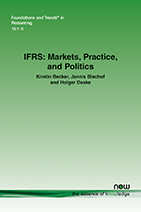IFRS: Markets, Practice, and Politics
By Kirstin Becker, Copenhagen Business School, Denmark, kbe.acc@cbs.dk | Jannis Bischof, University of Mannheim, Germany, jbischof@uni-mannheim.de | Holger Daske, University of Mannheim, Germany, daske@bwl.uni-mannheim.de
Abstract
This monograph reviews the academic literature on market outcomes, reporting practices and the political economy behind the global use of International Financial Reporting Standards (IFRS). We start with a conceptual discussion of expected benefits and costs of an international harmonization of accounting regulation and explain why predictions on possible outcomes are ambiguous. Section 3 discusses the characteristics of an “ideal” IFRS experiment that would allow to draw causal inferences on the effects of IFRS adoption. We offer a comprehensive overview of research on the impact of IFRS on capital markets, particularly around first-time adoption and during the global financial crisis. In Section 4, we describe current IFRS reporting practices, including digital reporting (XBRL), and benchmark the availability, accessibility, and processing of IFRS financial information against the information environment in the United States. We complement this discussion by evidence on the use of IFRS reporting choices such as the different fair value options. Section 5 provides information about important institutional features of IFRS standard setting and how political powers affect decisions on IFRS adoption, standard setting, and enforcement. The monograph concludes with an assessment of the impact of IFRS research and outlines emerging trends that provide opportunities for future research. Overall, this monograph offers a summary of research findings and methods that are relevant for the analysis of future regulatory innovations, such as the international standardization of sustainability (or ESG) reporting.
IFRS:Markets, Practice, and Politics
IFRS: Markets, Practice, and Politics reviews the academic literature on market outcomes, reporting practices and the political economy behind the global use of International Financial Reporting Standards (IFRS). Starting with a conceptual discussion of expected benefits and costs of an international harmonization of accounting regulation, the authors explain why predictions on possible outcomes are ambiguous.
The first section discusses the characteristics of an “ideal” IFRS experiment that would allow to draw causal inferences on the effects of IFRS adoption. It offers a comprehensive overview of research on the impact of IFRS on capital markets, particularly around first-time adoption and during the global financial crisis. The second section describes current IFRS reporting practices, including digital reporting (XBRL), and benchmark the availability, accessibility, and processing of IFRS financial information against the information environment in the United States. Complementing this discussion is evidence on the use of IFRS reporting choices such as the different fair value options. The third section provides information about important institutional features of IFRS standard setting and how political powers affect decisions on IFRS adoption, standard setting, and enforcement. The monograph concludes with an assessment of the impact of IFRS research and outlines emerging trends that provide opportunities for future research.
Overall, this monograph offers a summary of research findings and methods that are relevant for the analysis of future regulatory innovations, such as the international standardization of sustainability (or ESG) reporting.
